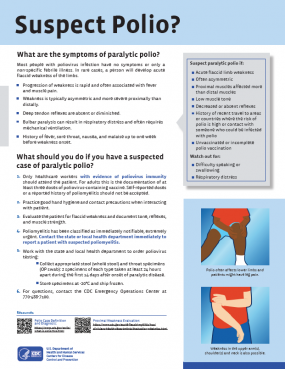If You Suspect A Case of Polio
Polio Investigation Information for Clinicians
Updated August 19, 2022
CDC urges all healthcare providers to ensure their patients are current on polio vaccine, especially those who may travel or be exposed to recent international travelers.
Healthcare providers should consider polio in the differential diagnosis of patients with sudden onset of limb weakness with history of fever and/or gastrointestinal illness, especially in unvaccinated individuals or those with recent international travel or exposures to international travelers.
Per the current investigation:
Unvaccinated close contacts of the patient are at highest risk.
- Every effort should be made to vaccinate all eligible persons in the communities that may be at risk.
- Improving vaccination coverage for polio and other vaccine preventable diseases is one of the core missions of CDC. Clinicians should take time in every primary care visit, adults, and children, to ensure that they are up to date with the recommended vaccines for their age.
Patients presenting with sudden onset of limb weakness and have an MRI with at least some gray matter involvement in the spinal cord should be reported to state/local health department as a possible case of acute flaccid myelitis (AFM).
If you have such a patient:
- Contact your state or local health department as soon as possible for instructions on how to report. You can direct urgent questions to the CDC Emergency Operations Center (770-488-7100). Email non-urgent questions to the CDC AFM team at AFMinfo@cdc.gov.
- Collect biological specimens for testing as soon as possible to increase the possibility of finding a causative agent.
- AFM Specimen Collection Instructions
- Note, it is critical to try and obtain two stool samples collected at least 24 hours apart, both collected as early in illness as possible and ideally within 14 days of illness onset (poliovirus is most likely to be detected in stool)
- Is not vaccinated or under-vaccinated against polio
- Has travelled to areas with higher risk of polio
- Has had a contact with someone infected with polio
To learn more about poliomyelitis clinical presentation, case definition, and reporting suspected cases, visit: Poliomyelitis: Information for Healthcare Providers.
